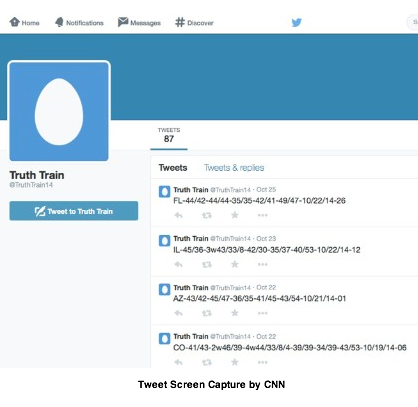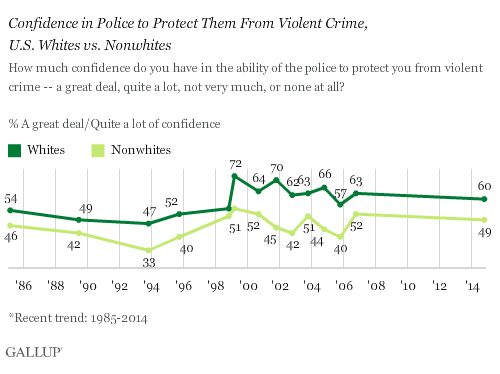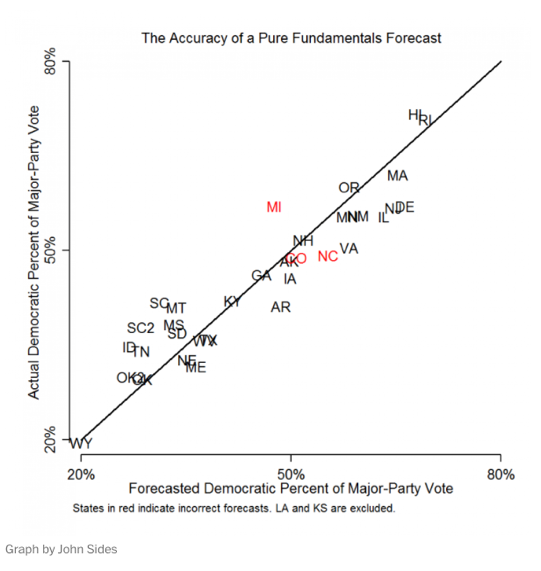
A trove of numbers posted to Twitter turn out to be secret polling data. Race plays a significant role in views of the police. And how good were the fundamentals at predicting elections? This is HuffPollster for Tuesday, November 18, 2014.
GOP SECRETLY SHARED POLLS VIA TWITTER - Chris Moody: "Republicans and outside groups used anonymous Twitter accounts to share internal polling data ahead of the midterm elections, CNN has learned, a practice that raises questions about whether they violated campaign finance laws that prohibit coordination. The Twitter accounts were hidden in plain sight. The profiles were publicly available but meaningless without knowledge of how to find them and decode the information, according to a source with knowledge of the activities. The practice is the latest effort in the quest by political operatives to exploit the murky world of campaign finance laws at a time when limits on spending in politics are eroding and regulators are being defanged....The groups behind the operation had a sense of humor about what they were doing. One Twitter account was named after Bruno Gianelli, a fictional character in The West Wing who pressed his colleagues to use ethically questionable 'soft money' to fund campaigns. A typical tweet read: 'CA-40/43-44/49-44/44-50/36-44/49-10/16/14-52-->49/476-10s.' The source said posts like that -- which would look like gibberish to most people -- represented polling data for various House races. The accounts that CNN reviewed were active in the months ahead of this month's election, which gave Republicans their largest majority in the House since World War II and control of the Senate. They were live until Nov. 3 but deleted minutes after CNN contacted the NRCC with questions." [CNN]
CNN's Chris Moody adds more via...Twitter: How many followers did these accounts have? Moody: "zero followers and the accounts didn't follow anyone." [@moody]
Can you break the code? Phillip Bump: "The messages were a sort of Twitter-based numbers station that looked like this: '@truthtrain14 FL-44/42-44/44-35/35-42/41-49/47-10/22/14-26'
That's an example of a tweet from an account called TruthTrain14 that appears to be outlining poll results from a House race. We can parse it to some degree:
- FL - The state
- 44/42, 44/44, 35/35, 42/41, 49/47 - Topline poll numbers. It's safe to assume that the first in the sequence is the overall split among all voters
- 10/22/14 - The date of the poll
- 26 - The district of the race
So this is a poll taken on Oct. 22 in the race between Carlos Curbelo (R) and Rep. Joe Garcia (D) in Florida's 26th Congressional District. Curbelo won by three points -- one more than this poll apparently shows....The follow-up list of poll numbers is probably a breakdown by ethnicity or gender, but it's hard to know which. That's perhaps the most important part of Moody's discovery. If it's impossible to translate the poll numbers without some special knowledge, that implies a level of coordination between campaigns and outside groups that moves this beyond a legal gray area and into a black one." [WashPost]
And the question poll junkies are asking - Nate Cohn: "So @moody, any shot we're going to get to see these poll results?" [@Nate_Cohn]
RACIAL GAP IN POLICE CONFIDENCE PERSISTS - Justin McCarthy: "As a grand jury decides whether to indict a white police officer for shooting an unarmed black teen in Ferguson, Missouri, Americans' confidence in their local police to protect them from violent crime continues to differ by race, as it has since Gallup started measuring it. White Americans (60%) surveyed last month expressed more trust in police than nonwhites did (49%), although the 11-percentage-point gap is slightly smaller than the average 14-point gap seen since 1985. Since 1985, Gallup has generally found double-digit differences between the percentages of U.S. whites and nonwhites who say they have 'a great deal' or 'quite a lot' of confidence in the ability of their local police to protect them. Just three times -- in 1985, 1989 and 1998 -- has the gap been below 10 percentage points." [[Gallup](http://www.gallup.com/poll/179468/nonwhites-less-likely-feel-police-protect-serve.aspx]
MORE RACIAL DIVIDES ON VIEWS OF POLICE - Nick Wing: "As issues of police brutality and accountability continue to receive national attention, a new HuffPost/YouGov poll shows about half of Americans aren't convinced calling law enforcement is an effective way to peacefully resolve a dispute….White respondents were more likely than any other race polled to say they thought police would resolve a situation peacefully, while black respondents were the most likely to say police would make it more volatile….The HuffPost/YouGov poll found large demographic disparities regarding the belief that police brutality takes place locally. Of total respondents, 29 percent said the problem existed around them, while 43 percent said it didn't and 27 percent said they weren't sure. Among white respondents, 25 percent said police brutality was an issue in their local law enforcement. But among black respondents, 58 percent said police brutality existed in their area, while 22 percent said it didn't and 20 percent weren't sure." [HuffPost]
HOW WELL DID 'FUNDAMENTALS' ALONE PREDICT ELECTION 2014? - John Sides: "Three of the forecasting models at media organizations — ours at Election Lab, The Upshot’s and 538′s — relied on a combination of 'fundamentals' and polls initially, but increasingly gave weight to the polls as Election Day approached. For this reason, these three forecasts largely dovetailed with the forecasts based only on polling data (Pollster, Daily Kos and the Princeton Election Consortium)...So imagine that we had predicted the election purely with where the fundamentals stood on Election Eve, while ignoring the polling entirely? How well would we have done? On balance, not badly. Here is a graph that compared a fundamentals forecast to the actual outcome in the Senate races. Unsurprisingly, there is a strong correlation (r=0.93). The fundamentals would have “called” 3 races incorrectly, which are highlighted in red. One interesting thing: in several races where the polls really underestimated the Republican candidate’s vote share — Kentucky, Georgia, South Dakota, West Virginia– the fundamentals did significantly better....Of course, the outcome forecasted by the fundamentals wasn’t always an improvement on the polls, as attested by states like Arkansas, Michigan and Virginia." [WashPost]
ENVIRONMENTAL ISSUES CUT ACROSS PARTY LINES - Susan Page: "President Obama's plan to sign an executive order on immigration, expected as early as this week, will meet more resistance than support, a new USA TODAY Poll finds….But on an interesting combination of other issues, the poll finds sweeping consensus in an electorate that isn't firmly tied to the views of either party. Those surveyed side by more than 2-1 with Obama on a just-announced climate agreement with China, for instance, and with Republicans on approval of the Keystone XL pipeline. They are more likely to identify themselves as independents than anything else; 34% say they aren't aligned with either party. Even after sweeping GOP gains in this month's midterms, just 24% identify themselves as Republicans; 32% say they're Democrats." [USA Today]
HUFFPOLLSTER VIA EMAIL! - You can receive this daily update every weekday morning via email! Just click here, enter your email address, and and click "sign up." That's all there is to it (and you can unsubscribe anytime).
TUESDAY'S 'OUTLIERS' - Links to the best of news at the intersection of polling, politics and political data:
-Republicans like many 2016 contenders better than Jeb Bush. [YouGov]
-A push to increase school lunches may complicate things for researchers who used participation in the programs as a proxy for poverty. [538]
-Ebola is one of Americans' top three healthcare concerns. [Gallup]
-Howard Feinberg summarizes an MRA post-mortem on the 2014 midterms featuring Jim Hobart (R), Jason Boxt (D), Bob Moran and HuffPollster. [MRA]
-Fact Tank explores the cyclical ups and downs of political campaign employment data. [Pew]
-A group of geography academics maps where racist tweets come from. [The Atlantic]
-xkcd finds a new application for statistical power. [xkcd]



